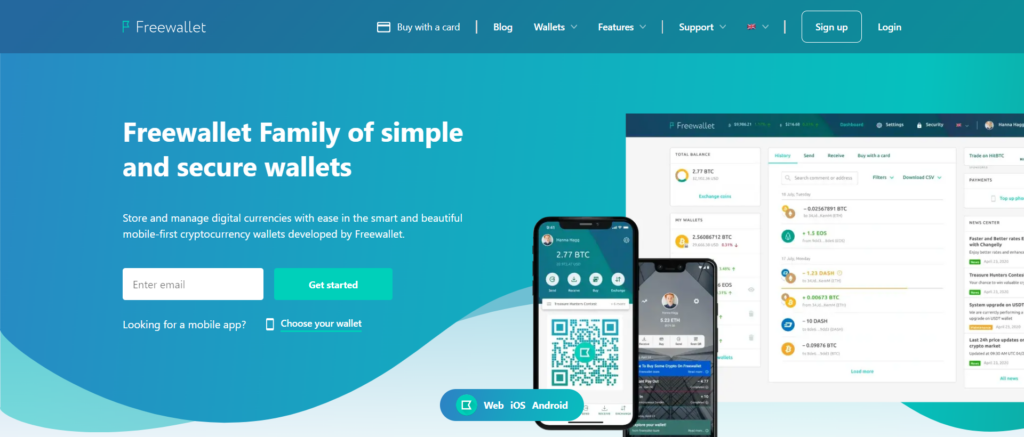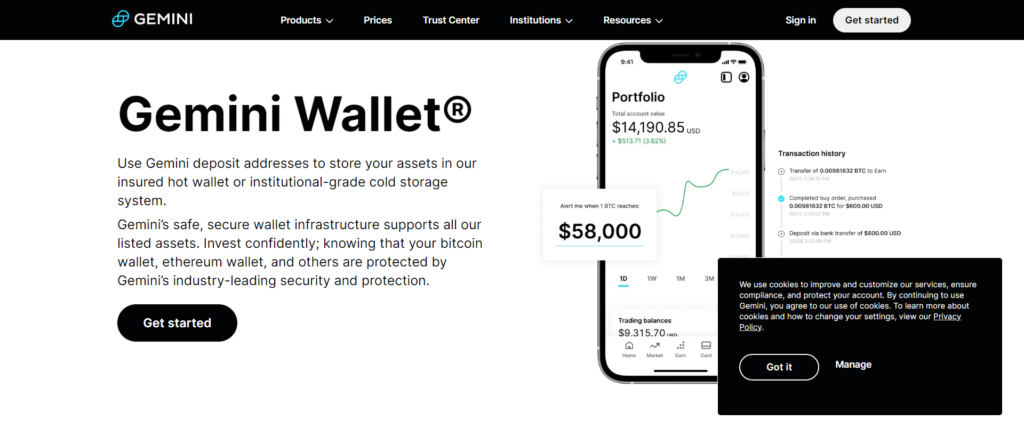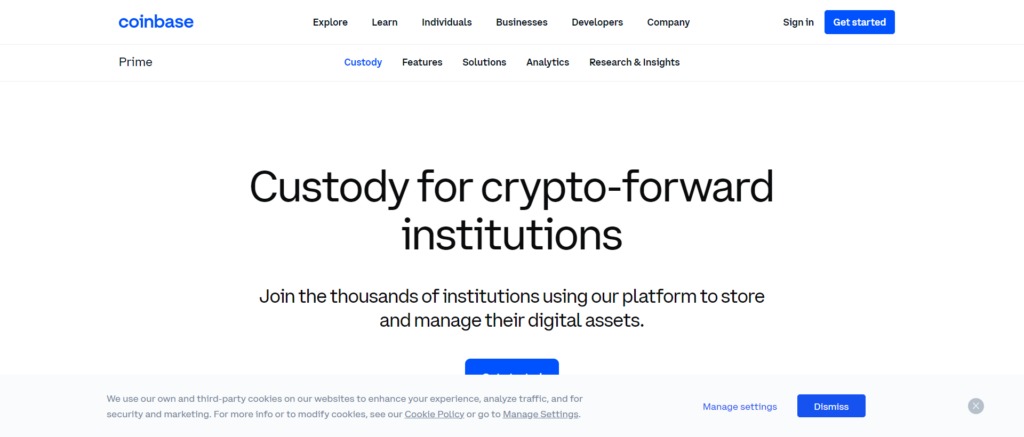7 Best Custodial Crypto Wallets in 2023
What makes a custodial crypto wallet the best? It’s not a single thing. The best crypto wallets in the market offer a combination of strong security measures, insurance and excellent customer support.
Even though you get a custodial wallet by signing up on a centralized crypto exchange by default, some people still seek out separate platforms where they can store their crypto assets.
Why?
Because they don’t meet the standards for “best”, and if you’re entrusting large sums of your crypto funds with a custodian, you need to ensure they are reliable and trustworthy.
That is why we have compiled a list of the 7 best crypto wallets of 2023.
But before that, let’s quickly go over what custodial crypto wallets are and how they work.
What are Custodial Crypto Wallets?
As you might know, crypto wallets have two primary components that help them function – the public and private key.
The public key is your public address available to anyone and everyone who wants to transfer funds to your wallet.
The private key, on the other hand, is a secret code only available to you, as it should be. It’s like a password or pin you enter to confirm a transaction on Venmo or CashApp.
The only difference is the private key is a large combination of letters and numbers, almost impossible to remember as you can with a password. Therefore, some people find it difficult, probably even a hassle, to manage and keep the private key safe.
And that’s where custodial crypto wallets come in. In a custodial wallet, instead of you, a third party, called the custodian, is responsible for managing and keeping your private key safe in return for a fee for their services. In simple words, custodial wallets sell convenience.
How Do They Work
It’s pretty straightforward. If you want to transfer your crypto assets to another wallet, you just complete a transaction as you normally would.
The only difference is it’s up to the custodian to verify your transaction request and enter the private key on your behalf to finalize the transaction. But that happens behind the scenes.
As you can guess, this makes the transactions on custodial wallets a bit slower than on non-custodial wallets. And that’s not the only difference between them.
Check out the complete guide on custodial vs non-custodial crypto wallets to know which is better.
1. Cobo Wallet

Cobo is undoubtedly the most secure custodial wallet on this list, and that is what makes it one of the best custodial crypto wallets.
Its military-grade security measures include bank-standard HSM, hot-cold separation of funds, multi-signature authentication, key sharding and global key distribution.
Beyond that, every user’s wallet is protected by multiple layers of authentications, including a custom payment password, Google Two-Factor Authentication, complete KYC, and SMS notification when you log in or make a successful transaction.
It supports more than 1600 tokens and over 60 different blockchains. It also provides Hierarchical Deterministic wallets that allow transactions on decentralized protocols and applications.
However, all of this comes with a cost, a quite expensive one. But some would argue it’s worth it.
2. Freewallet

Freewallet is one of the best custodial crypto wallets for individual users. You don’t need to be a business or institution with a massive investment amount to open a Freewallet account.
In terms of security, Freewallet is decent. It’s a combination of hot and cold storage wallets and offers two-factor authentication, which is nothing special as it has become an industry standard now.
It supports over a hundred cryptocurrencies and even fiat-to-crypto trade with a built-in crypto exchange (Changelly). It has a simple and intuitive interface, making it ideal for beginners.
3. Bakkt

Bakkt offers institutional-grade custody services with decent security measures and features.
In terms of security, Bakkt offers a combination of warm and cold multi-signature wallets. It’s also approved and regulated by the New York Department of Financial Services. Your crypto assets in Bakkt wallets are insured as well (subject to policy terms).
Overall, Bakkt is undoubtedly one of the best custodial crypto wallets out there, with a healthy balance of security, control and convenience.
4. BitGo

BitGo, in some sense, pioneered the multi-signature hot wallet concept. It has different products for different customer types, but ideally, BitGo is best suited for large businesses and big investors.
Why?
BitGo’s custody services, as good as it, requires you to deposit a minimum of $1 million worth of crypto in your wallet. BitGo Business wallet, on the other hand, requires a minimum of $1 million in monthly transactions. Both support up to 500 different cryptocurrencies.
These are big numbers that the majority of crypto users can’t fulfill. However, BitGo also offers a Pay As You Go option, a hot wallet service with no minimum deposit or transaction amount. However, it only supports seven cryptocurrencies, including Bitcoin, Bitcoin Cash, Bitcoin Gold, Litecoin, Zcash, Stellar and Dash.
5. Venly Wallet

Venly is among the best custodial crypto wallets for its easy-to-use interface and ecosystem. However, whether it’s one of the most secure is vague.
Why?
Because Venly doesn’t provide a lot of information upfront on how they keep your crypto assets safe and secure. All we know regarding security is that they provide multi-factor authentication.
Venly wallet is better suited for businesses and enterprises, and its features and subscription plans are accordingly.
It supports storing cryptocurrencies from 12 blockchains plus NFTs (Venly also has other products, including an NFT marketplace). It also has one of the best customer support.
Overall, if you’re running a business in the crypto space, especially in the NFT space, and require custom features and UX design, Venly is your best option. However, if you’re an individual, you’re better off with something else.
6. Gemini Wallet

Despite its many limitations and drawbacks, the Gemini wallet is one of the best custodial crypto wallets for beginners.
It supports over 60 cryptocurrencies over 8 blockchains and is ideal for beginners with minimal monthly transactions. Security-wise it may not be the best, but definitely not poor either. It also lacks customer support, as it only provides help desk articles and an email outreach option.
Overall, the Gemini wallet may be a good starting point for beginners, but it serves more as a layover point for trading or staking for advanced crypto users.
7. Coinbase Custody

Coinbase Custody is ideal for institutional-grade investors, as it offers the same security measures that it uses to safeguard its own $20B+ crypto assets, along with insurance to protect your assets from theft, hacks and other unfortunate events.
It supports over 90% of the cryptocurrencies available in the market, and more can be added upon client request. Since it’s new, the features it provides are pretty basic, but they do plan to expand its services and products in the future.
Here’s a comprehensive guide by Coinbase itself on their custodial services if you want to learn more about it.
Final Thoughts
Many of the entries in this list are best suited for large investors and enterprises, which is great if that is who you are. But if not, there are plenty of options for individual users too.
Also, don’t forget, you get a basic custodial crypto wallet with an exchange anyway, which might not be the best, but gets the job done. But if you want more freedom, accessibility and wiggle room with your crypto assets and how you use them, consider using non-custodial crypto wallets.